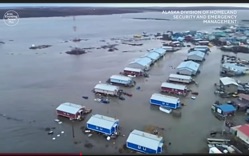Typhoon Halong Has Devastated Parts of Western Alaska with Flooding, Displacing Hundreds; How You Can Help Survivors
Alaska Public Media/Eric Stone : Oct 20, 2025
Alaska Public Media
Cash donations are a better option than goods, since storing and transporting items can present challenges of their own, said Jenni Ragland, chair of Alaska Voluntary Organizations Active in Disaster.
 [AlaskaPublic.org] [Reprinted with permission] Community groups and businesses across the state are coordinating relief efforts after the remnants of Typhoon Halong brought widespread devastation to Western Alaska. (Screengrab image: via CBS Evening News)
[AlaskaPublic.org] [Reprinted with permission] Community groups and businesses across the state are coordinating relief efforts after the remnants of Typhoon Halong brought widespread devastation to Western Alaska. (Screengrab image: via CBS Evening News)
The storm has killed one person, left two missing, displaced hundreds and destroyed or damaged dozens of homes, especially in the hardest-hit communities of Kipnuk and Kwigillingok.
Here's how you can help.
Financial support: The Western Alaska Disaster Relief Fund
The Alaska Community Foundation, an Anchorage-based nonprofit, has partnered with organizations serving people throughout the Yukon-Kuskokwim Delta region, Norton Sound and the Northwest Arctic to funnel financial donations to people affected by the storm.
The organization is accepting donations at its website.
"The thing that's unique about this fund is that we have partnered with local and regional organizations to make sure that the money goes to the areas that it's needed most," the Alaska Community Foundation's Ashley Ellingson said in an interview. "Since we are not on the ground, we rely on those partnerships to make sure that the gifts and donations are the most impactful."
The Alaska Community Foundation is partnering with the Alaska Federation of Natives, the Association of Village Council Presidents, the Alaska Native Tribal Health Consortium, Yukon Kuskokwim Health Corp., Kawerak, Inc. Maniilaq Association and a number of other local, regional and statewide groups.
The foundation embarked on a similar effort in the wake of 2022's Typhoon Merbok. As of 1 p.m. Tuesday, the fund had raised more than $300,000 from 3,550 donors, Ellingson said.
Cash donations are a better option than goods, since storing and transporting items can present challenges of their own, said Jenni Ragland, chair of Alaska Voluntary Organizations Active in Disaster.
"While it may seem impersonal, cash really is the best opportunity to help meet those immediate needs that are coming our way," she said at a news conference Tuesday. "It provides flexibility for us to purchase exactly what's needed, to procure those items quickly and to get them into the hands of disaster survivors."
Other donations
A variety of organizations, though, are taking goods to distribute to survivors or contributing in other ways. Organizers request that donations include new and unused items only, and that the donations be limited to water, diapers, wipes, formula, non-perishable food, bedding, toilet paper, hand sanitizer, portable phone chargers and flashlights.
- The Alaska Federation of Natives says it's gathering supplies Friday, Oct. 17, from 1 p.m. to 5 p.m. at the Dena'ina Center's Room 6, on the second floor. Donations will also be accepted Saturday, Oct. 18, from 8 a.m. to 2 p.m.
- The Alaska Native Heritage Center is holding a benefit concert at Williwaw Social, 609 F St. in Anchorage, on Saturday, Oct. 18 from 6 to 10 p.m. Tickets are on sale online, and the group says it's donating 25% of proceeds to relief efforts.
- Alaska Children's Urgent Care, at 751 East 36th Ave. in Anchorage, says it is taking children's items, such as diapers, wipes, pediatric care supplies, socks, shoes and warm clothing for children of all sizes. Donations will be accepted 11 a.m. to 5 p.m. through Friday, Oct. 17.
- Susitna Energy Solutions says it is collecting supplies at its office at 1432 Ingra St. in Anchorage from 9 a.m. to 6 p.m. Monday through Friday.
- Alaska Discount Outfitters is offering a 10% discount to customers that bring donations to its location at 3401 Commercial Drive in Anchorage. Donations will be accepted Wednesday through Friday from noon to 7 p.m. and Saturday and Sunday from 10 a.m. to 7 p.m.
- GCI says it is accepting donations at its C Street, Dimond Center, Muldoon and Abbott retail locations in Anchorage, as well as in Wasilla and Fairbanks.
- The Fairbanks nonprofit Straw for Dogs is fundraising to provide doghouses and straw for families in the region.
- The Association of Village Council Presidents is requesting that donations be dropped off at the Bethel Search and Rescue building at 499 State Highway in Bethel.
- The Yute Commuter Service dispatch office in Soldotna is accepting donations through Saturday night at 627 Funny River Road at the local airport. Subscribe for free to Breaking Christian News here
